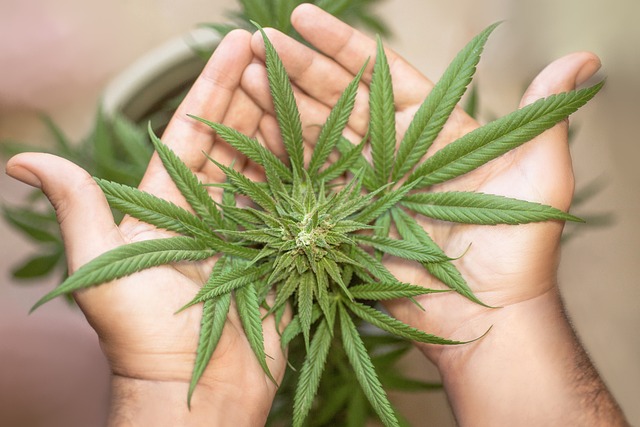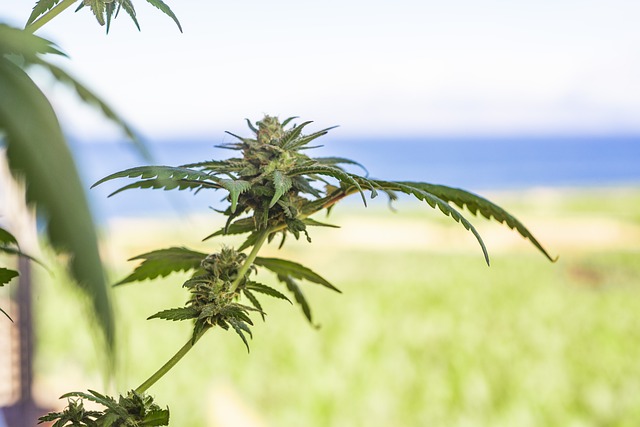2023 marked a significant advancement in Mississippi's approach to cannabinoids with the recognition of THCA (Tetrahydrocannabinolic Acid) as a non-psychoactive therapeutic compound. The state's legislative changes have made THCA legal in Mississippi for medical purposes under certain conditions, paving the way for research into its anti-inflammatory and neuroprotective benefits. THCA flowers, which are rich in this cannabinoid, offer potential relief from conditions like chronic pain, multiple sclerosis, and chemotherapy-induced nausea without the psychoactive effects associated with THC. The evolving legal status of THCA has positioned Mississippi at the forefront of exploring its medical applications, providing patients with alternative treatments that complement traditional therapies. As studies continue to unfold the full scope of THCA's therapeutic capabilities, it emerges as a significant natural treatment option within the state's regulated medical cannabis program, enhancing well-being for those who can legally utilize it.
Exploring the emergent wellness trend, this article delves into the multifaceted benefits of THCA flowers from a legal standpoint within Mississippi. As a non-psychoactive cannabinoid, THCA is gaining prominence for its potential therapeutic properties and is becoming increasingly accessible across the state. We’ll dissect how THCA differs from its psychoactive counterpart, THC, and what these differences mean for your health and wellness journey. Join us as we navigate the intricacies of THCA’s legal status in Mississippi, the cultivation processes on compliant farms, and the guidelines for safe consumption. With an in-depth look at the entourage effect and the role of THCA within full-spectrum hemp products, this article is a comprehensive guide to understanding and incorporating THCA flowers into your routine, all while staying informed about the latest research and market trends.
- THCA Flower Benefits Unveiled: A Legal Perspective in Mississippi
- Understanding THCA: The Non-Psychoactive Cannabinoid Gaining Attention
- THCA vs. THC: The Differences and Their Implications for Health and Wellness
- The Rise of THCA Flowers in Mississippi: Legal Status and Accessibility
- Potential Therapeutic Properties of THCA Flower: An In-Depth Exploration
- How THCA Flowers Can Enhance Your Wellbeing Without the High
THCA Flower Benefits Unveiled: A Legal Perspective in Mississippi

In Mississippi, the discussion around cannabis and its derivatives has seen significant evolution, particularly with the emergence of THCA (Tetrahydrocannabinolic Acid), a non-psychoactive precursor to THC (Delta-9-Tetrahydrocannabinol). As of recent legislation updates, THCA is legal in Mississippi under certain conditions. This has opened doors for research into the potential benefits of THCA flower, which proponents claim may offer therapeutic properties without the psychoactive effects typically associated with cannabis. The legislative framework allows for the study and use of THCA for specific medical purposes, marking a new chapter in the state’s approach to cannabis-related compounds. This legal clarity provides an avenue for both scientific investigation into the benefits of THCA and for patients seeking alternatives to traditional medications.
The therapeutic potential of THCA flower is a subject of growing interest among health enthusiasts and medical professionals in Mississippi. Evidence suggests that THCA may possess anti-inflammatory, neuroprotective, and anti-nausea properties, which could be beneficial for conditions such as chronic pain, multiple sclerosis, and nausea associated with chemotherapy. As the legal landscape continues to shift, it is imperative for consumers and patients to stay informed about the regulations and potential benefits of THCA, ensuring they comply with state laws while exploring this promising cannabinoid. The legal status of THCA in Mississippi represents a progressive step towards recognizing the diverse compounds within the cannabis plant and their individual contributions to health and well-being.
Understanding THCA: The Non-Psychoactive Cannabinoid Gaining Attention

THCA, or tetrahydrocannabinolic acid, is a natural cannabinoid found in the Cannabis sativa plant that has garnered significant attention for its potential wellness benefits. Unlike its more famous counterpart THC, which is psychoactive and legally regulated, THCA exists in raw cannabis and hemp plants and does not induce the ‘high’ typically associated with cannabis consumption. As such, THCA-rich products are becoming increasingly popular for those seeking the therapeutic properties of cannabinoids without the psychoactive effects. The interest in THCA is further amplified by its legal status; in states with permissive cannabis laws, including Mississippi where THCA legal status aligns with certain CBD and hemp-derived products, consumers are exploring this non-psychoactive alternative for its reported anti-inflammatory, neuroprotective, and anxiolytic effects. Research into the full scope of THCA’s benefits is ongoing, but its potential as a natural remedy for various conditions has prompted a surge in interest among both researchers and consumers, particularly those intrigued by the evolving legal landscape surrounding cannabinoids.
THCA vs. THC: The Differences and Their Implications for Health and Wellness

Delta-9-tetrahydrocannabinolic acid (THCA) and delta-9-tetrahydrocannabinol (THC) are both prominent cannabinoids found in the Cannabis sativa plant. While THCA is the non-psychoactive precursor to THC, their distinct properties offer different health and wellness implications. THCA is known for its potential anti-inflammatory and neuroprotective effects, which may be beneficial for a variety of conditions. Conversely, THC, once heated or ingested, can produce psychoactive effects associated with the traditional “high” felt from cannabis consumption. However, THC also has therapeutic properties, including pain relief, appetite stimulation, and as an antiemetic.
In Mississippi, where laws have evolved to allow certain forms of medical cannabis, both THCA and THC are subjects of growing interest due to their medicinal potential. It’s worth highlighting that THCA is legal in Mississippi under specific conditions for medical use, particularly for individuals with debilitating medical conditions as approved by a licensed healthcare provider. This legal status opens up opportunities for research and the development of THCA-based treatments that could complement existing therapies, offering new avenues for health and wellness improvement. As such, both compounds hold promise for those seeking alternative or adjunct treatments within the legal framework set by Mississippi’s regulations.
The Rise of THCA Flowers in Mississippi: Legal Status and Accessibility

In recent years, THCA (Tetrahydrocannabinolic Acid) flowers have gained prominence within the cannabis community, particularly in states where their use has been legalized. Mississippi, with its evolving legal landscape, has seen a notable rise in the availability and popularity of THCA flowers. The legal status of these flowers in Mississippi is nuanced, as it allows for the possession and use of cannabis products containing low THC levels for medicinal purposes. The Mississippi Medical Cannabis Act, enacted in 2021, paved the way for patients with qualifying conditions to access medical marijuana, including THCA flowers that have not been heat-activated to transform into THC, thereby offering a non-psychoactive alternative with potential therapeutic benefits.
Accessibility of THCA flowers in Mississippi has improved as dispensaries have begun to open their doors to patients with valid prescriptions. The state’s regulatory framework dictates strict controls over the cultivation, processing, and sale of these products, ensuring that they are safe for consumer use. Patients and healthcare providers in Mississippi are increasingly recognizing the potential wellness benefits of THCA flowers, which some claim may offer relief from various ailments without the psychoactive effects associated with its activated form, THC. This has led to a growing interest and demand for these non-psychoactive cannabinoid products, positioning Mississippi as one of the states at the forefront of this emerging market within the broader legal cannabis industry.
Potential Therapeutic Properties of THCA Flower: An In-Depth Exploration

Throughout recent years, the therapeutic properties of cannabinoids have garnered significant interest within medical and wellness communities alike. Among these compounds, Tetrahydrocannabinolic Acid (THCA), which is the non-psychoactive precursor to THC found in raw cannabis flowers, has particularly piqued researchers’ curiosity due to its potential health benefits. THCA is known for its anti-inflammatory and neuroprotective effects, which may be beneficial in managing various conditions, from chronic pain to neurodegenerative diseases. As of the knowledge cutoff in 2023, THCA flower’s legal status in Mississippi allows for its exploration within the bounds of state law, offering a viable option for those seeking therapeutic relief without psychoactive effects.
Mississippi’s legislative framework has been evolving to accommodate medical marijuana, with specific provisions allowing for the use of cannabis products that contain THCA. This legal clarity has paved the way for more research and the availability of THCA flower as a potential treatment option for a range of health issues. Studies suggest that THCA interacts with the body’s endocannabinoid system, influencing various physiological functions. Its anti-inflammatory properties are believed to be particularly promising for individuals suffering from conditions like arthritis or multiple sclerosis, where inflammation plays a significant role. Furthermore, THCA’s potential as an antiemetic agent makes it a candidate for treating nausea and vomiting associated with chemotherapy. As research continues to expand, the full scope of THCA flower’s therapeutic properties may be further elucidated, offering new avenues for natural treatment and improved well-being for those in Mississippi who can legally access these products.
How THCA Flowers Can Enhance Your Wellbeing Without the High

THCA, or tetrahydrocannabinolic acid, is a non-psychoactive cannabinoid found in the Cannabis sativa plant that has garnered attention for its potential wellness benefits. Unlike its well-known derivative THC (tetrahydrocannabinol), THCA does not induce a psychoactive “high,” making it an appealing option for individuals seeking the therapeutic properties of cannabinoids without the mind-altering effects. In Mississippi, where certain forms of cannabis have been legalized, THCA flowers are increasingly recognized for their health-promoting qualities. These flowers contain high concentrations of THCA due to being harvested at an early stage of the plant’s maturity. Users report that THCA flowers can help alleviate pain and inflammation, improve mood, and support overall wellbeing. The cannabinoid is believed to interact with the body’s endocannabinoid system, which regulates various physiological processes, including sleep, immune response, and appetite. As a result, THCA flowers are being explored for their role in supporting healthy joints, promoting restful sleep, and enhancing mental clarity. The legality of THCA flowers in Mississippi is clear under the state’s medical cannabis program; patients with qualifying conditions can legally access these products. This has opened up new avenues for natural wellness, allowing residents to harness the benefits of cannabinoids in a way that aligns with their lifestyle and needs.
THCA flower has emerged as a subject of growing interest, particularly within the context of its legal status and potential benefits in Mississippi. This article has illuminated the distinctions between THCA and its psychoactive counterpart, THC, highlighting the unique therapeutic properties that THCA offers without the mind-altering effects. As we’ve explored, the rise of THCA flowers aligns with shifting legal landscapes in Mississippi, making these products more accessible to those seeking alternative wellness solutions. The evidence suggests that incorporating THCA flowers into one’s health regimen could hold significant promise for wellbeing enhancement, and this is a narrative that will undoubtedly continue to unfold as research progresses and legal frameworks evolve.
In light of the insights presented, it’s clear that THCA flower benefits are not only gaining attention but also have a legitimate place in discussions about health and wellness, especially from a legal standpoint in Mississippi. Future developments will likely further elucidate its role in various therapeutic applications, underscoring the importance of continued research and informed policy-making to support these emerging options for better health outcomes.
